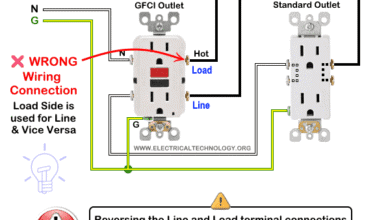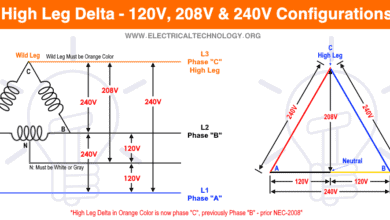Difference Between the terms ‘Electronic Engineering’ and ‘Electronics Engineering
The terms “Electronic Engineering” and “Electronics Engineering” are often used interchangeably. Both terminologies are acceptable to specify a branch of engineering that deals with the design and applications of semiconductor devices and components, electronic circuits, and systems. The meanings of these ambiguous terms can vary depending on context, degree offered by an institute and geographical locations.
- Related Post: Difference Between Electrical & Electronic Engineering
Good to Know:
Electronic vs Electronics
- “Electronic Engineering” is the term used in North America (US and Canada).
- “Electronics Engineering” is the term used in the UK, Australia, the EU, and other English-speaking countries.
- Electronic: refers to anything related to electronics engineering or electricity.
- Electronics: refers to the filed of study of electronic circuits, devices and systems.
- Math vs Maths: It is the same case where ‘Math’ is used in the US and Canada, while the term ‘Maths’ is more often used in the UK, EU, and other English-speaking countries to represent mathematics.
- Electrical Engineering: It is a completely different field of engineering than electronics engineering, with a little bit of overlapping.
- Electrical Technology: It is a sub-branch of electrical engineering that focuses on technical and practical skills while utilizing the theories of electrical and electronic circuits.
However, there can be subtle differences in interpretation, and the usage may depend on regional conventions or specific academic programs. In many cases, the distinctions between the two terms are minimal, and they are used synonymously.
Electronic Engineering (US):
-
- This term is often used an adjective to describe a broader field of engineering that encompasses various aspects of electronics.
- “Electronic” is the general term used to describe anything related to electronics or low voltage electricity.
- “Electronic engineering”, as a course or program offered by an educational institute, describes a broad field of engineering that focuses on control systems, communication systems, signal processing, and power electronics systems.
- “I have a degree in electronic engineering“, which signifies that I studied electronic circuits with practical skills in making electronic devices while seeking a career in electronics.
Electronics Engineering (UK/EU):
-
- The term ‘Electronics Engineering’ is more common, acceptable, and widely used by educational institutions and universities offering a degree in the field.
- “Electronics” is the term used for studying electronics circuits, devices and components, systems and applications.
- Electronics engineering typically focuses more narrowly on the design, analysis, and application of electronic circuits and systems. It is often associated with the study of semiconductor devices, integrated circuits, analog and digital electronics, and other related topics.
- “I’m an electronics engineer,” means I am involved in designing electronic systems, not an engineer made of electronic devices, such as a machine or robot powered by electricity. This way, I’m preparing for a career for the job title of “Electronics Engineer”.
Comparison of the terms Electronic & Electronics in Electronic(s) Engineering
| Aspect | Electronic Engineering | Electronics Engineering |
| Terminology | Often used interchangeably | More common and widely used |
| Geographical Usage | US and Canada | UK, Australia, EU, and others |
| General Description | Broader field of engineering | Focused on electronic circuits |
| Adjective Usage | Describes a broader field | Commonly used for study in electronics |
| Usage in Sentences | “I have a degree in electronic engineering.” | “I’m an electronics engineer seeking carrier in electronics engineering.” |
| Scope of Study | Encompasses various aspects of electronics | Focuses on design, analysis, and application of electronic circuits and systems |
| Degree Offering | Broad field of engineering | Specific degree in electronics engineering |
| Terminology Clarification | Electronic refers to anything related to electronics engineering or electricity | Electronics refers to the field of study of electronic circuits, devices, and systems |
| Specificity in Focus | Broad focus on electronics as a whole | Specific focus on electronic circuits and systems |
| Adjective vs Noun | Often used as an adjective | Used as a noun for the field of study |
| Synonymous Usage | Yes | Yes |
Overall, There is no strict rule dictating which one is more accurate, but it depends on many factors. While there might be nuanced differences in the interpretation of these terms, they are often used interchangeably to denote the exact same thing.
Apart from this, electrical engineering is distinct from electronic(s) engineering, with a slight overlap. However, the precise choice between ‘electronic’ or ‘electronics’ depends on the official degree, department, academic and professional program, or specific contexts or regions where one term is preferred over the other.
Related Posts:
- Basic Electrical Engineering Interview Questions and Answers
- Basic Electronics Engineering Interview Questions & Answers
- Basic Electrical & Electronics Engineering Interview Questions & Answers
- Top Electrical Projects ideas for Engineering Students
- Electronics Engineering Project Ideas for Engineering Students
- Top Electrical Mini Projects Ideas List
- Simple and Basic Electronics Mini Project Ideas for Beginners
- Electrical Engineering Final Year Projects
- Electronics Final Year Projects Ideas List

 GFCI Outlet – Line vs Load – What is the Difference?
GFCI Outlet – Line vs Load – What is the Difference? Difference Between NEMA 14-50 Standard Vs EV Receptacle
Difference Between NEMA 14-50 Standard Vs EV Receptacle Should GFCI Protection Be in the Main Panel or Receptacle?
Should GFCI Protection Be in the Main Panel or Receptacle? Why Does the High Leg Measure 208V Instead of 120V?
Why Does the High Leg Measure 208V Instead of 120V? Why are 1-Phase Motors Not Self-Starting Like 3-Phase Motors?
Why are 1-Phase Motors Not Self-Starting Like 3-Phase Motors? Why are High-Power Devices Not Designed to Run on DC Voltage?
Why are High-Power Devices Not Designed to Run on DC Voltage?